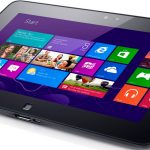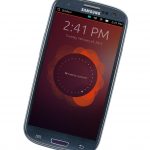Google adds a new Settings app to Android devices

If you have an Android phone, check your apps -- you’ll likely have a new one lurking there. The green Google Settings app, added today, gives users quick access to various settings for services such as Google+, Apps with Google+ Sign-in, Maps & Latitude, Location, Search, and Ads. The options you see will depend on your device and what’s enabled.
The biggest, most noteworthy feature here is of course Google+ Sign-in which lets you to use your Google ID as a universal sign-in for third-party apps and services. My colleague Joe Wilcox discussed the possibilities of this following Google’s announcement of its new authentication system yesterday.
Dell unveils the Latitude 10 Enhanced Security tablet

Dell has rolled out a new, more secure iteration of the 10-inch, business-oriented Windows 8 tablet it originally launched five months ago.
The Latitude 10 in stock trim, retails from $449 as an "essentials" model, but the American computer manufacturer has government agencies, financial institutions and healthcare organizations in its sights with the more expensive Enhanced Security model, which is available for $779, a not so insignificant difference.
Photoshop Touch now available for smartphones

Adobe’s Photoshop Touch app for tablets is a great photo editing tool and now it’s available for handsets running iOS and Android, so you can polish up your snaps before sharing them online, or do something even more creative.
The app is packed with powerful features such as layers, selection tools, adjustments and filters, and there’s even a clever Camera Fill function which will let you use your device’s camera to fill an area on a layer. The app can handle images up to 12 megapixels in size and you get 2GB of free Adobe Creative Cloud space to store your pictures in.
Edit audio with no loss of quality using WaveShop

If you’d like to edit an audio file then there’s plenty of free tools around to help, however most of them are prone to altering your files in unexpected ways. To test this yourself, just open any file, save it with a different name, and compare that file with the original. Even though you’ve not performed any operations on the second file at all, you’ll still often find there are differences, and inevitably that’s going to mean some compromise in sound quality.
WaveShop takes an alternative approach. The program is specifically designed to be bit-perfect, only altering your audio when it’s absolutely necessary. So if you open a file and then save it immediately, there will be no changes. And if you carry out some editing task on one area of the file -- fade it out at the end, say -- everything else remains exactly as it was.
Ubuntu Touch developer preview coming to more devices soon

My colleague Mihaita Bamburic posted his first impressions on the preview version of Ubuntu Touch yesterday, and now Canonical has announced its intention to bring the early version of the mobile operating system to a further 20+ devices.
Originally only available to install on the Galaxy Nexus, Nexus 4, Nexus 7, and Nexus 10, the developer preview gives installers an early start with Ubuntu Touch, but it’s currently a taster, more than an actual, fully usable operating system.
Accidental Empires, Part 10 -- Amateur hour (Chapter 4)
Is your hard drive in shape? BenchMe

If your PC has multiple drives – or even just several USB keys -- then you’ve probably already decided exactly how each drive is going to be used. But are you sure that decision is correct? Do you know which drive is the fastest, for instance? If that might make a difference, then BenchMe is a simple and free device benchmarking tool which may be able to help.
The program comes in a very small download (703KB), which unfortunately then requires installation. We’re not quite sure why -- it looks like the kind of tool which could very easily be portable -- but at least there’s no adware or other dangers to worry about.
Twitter 2.0 rolls out for Windows Phone

Just yesterday Twitter announced a planned app for the Firefox OS phones when they begin shipping, but the company is bringing that same functionality to Windows Phone, so do not feel left out. Today Microsoft's Michael Stroh did the honors of making the announcement.
The update is not much different than what has been promised for the Mozilla mobile OS. Customers will receive four new navigation tabs -- Home, Connect, Discover and Me.
Google+ Sign-In is a Facebook killer

Single sign-on. Universal log-in. It is the Holy Grail of Internet services. Coming into the new century, Microsoft planned to use Passport as a universal, single sign-on authentication system aligned with Windows. Following privacy group complaints, a Federal Trade Commission investigation and subsequent settlement, Microsoft backed off the authentication strategy. A decade later, Facebook emerged as contender; many sites or services request, and some even require, signing in with Facebook credentials. Twitter is another option, and there are other choices, such as OpenID.
Now Google comes calling, today adding Google+ Sign-In as an option developers can include with their apps. I cannot overstate just how bold and disruptive the authentication system could be, or how much Google could -- scratch that, most likely will -- benefit. If widely adopted, the service could, if nothing else, give Google+ huge lift against Facebook. Welcome to the social network wars, and my money is on the the big G winning because Android, search and other assets offer so much leverage.
Ubuntu Touch -- interesting concept that needs work [preview]

The concept of Canonical taking a stab at the mobile market eludes me. Unless we want to split hairs, which I know will happen, Android already is the Linux ambassador across the globe, so why would the world need Ubuntu Touch? Furthermore, any new player starts out with a clean slate, which means many consumers will be skeptical at purchasing devices running the new operating system and therefore developer interest does not surpass a low threshold.
The PC market is not what it used to be a couple of years ago when people rushed out to buy new computers, rather than tablets or smartphones first. In some ways Canonical right now is Microsoft before Windows Phone and Windows 8 -- an important player further heading into obscurity down the road unless the boat steers in the right direction. Ubuntu Touch is supposed to give the world a breath of fresh air, the X factor that would sway enough people into switching from Android, iOS, Windows Phone or a feature phone, even.
EssentialPIM 5.5 adds support for Dropbox and iCloud

Astonsoft Ltd has released EssentialPIM Free 5.5 and EssentialPIM Pro 5.5, major new versions of its Windows personal information manager. Highlights in this new release include support for iCloud synchronization, native Dropbox support and improved CardDAV tools.
Also updated are EssentialPIM for iOS 2.6 and EssentialPIM for Android 1.8.2, mobile apps designed to give users access to their EssentialPIM data while on the move. While iOS users only see minor bug fixes in this update, Android users will enjoy major improvements to the Calendar and Contacts modules.
HP unleashes 'augmented reality photos' for iOS

Today HP announced Live Photo for the iOS platform -- an app that claims to bring the user's photos to life using "augmented reality". The company claims the app will bring "a new consumer printing experience by embedding short video moments into printed photos".
According to Annie Weinberger, a general manager at HP-subsidiary Aurasma, "augmented reality is the new medium for bringing the physical world to digital life and HP Live Photo puts the power of this technology into the hands of everyday consumers". The free app purports to merge still images and short videos utilizing Aurasma. Once the app has been downloaded from the iTunes App Store the user can choose a video of up to 45-seconds in length and then select an automatically generated still image. From there it is a matter of choosing a template and sharing the new creation. The new photo/video can be shared via email, Facebook or by printing to any AirPrint-enabled printer.
U.S. smartphone adoption is lowest in developed world, South Korea highest

Today at Mobile World Congress, Nielsen offered a snapshot of the global mobile consumer based on a report released this month. Some of the findings are quite startling. For example, mobile phone usage is highest in South Korea -- get this, 99 percent among consumers older than 16. Same goes for smartphones (67 percent). By comparison, the United States has the lowest smartphone adoption among developed markets (53 percent). Now contrast that to China, where two-thirds of handset owners have smartphones, while in India 80 percent have feature phones. In Brazil, feature phones and multimedia handsets combined: 65 percent.
Mobile phone usage is high in many countries, but infrastructure is not. For example, 98 percent of Russians have mobiles, as do 84 percent in Brazil and 81 percent in India. Problem, according to Nielsen: "The network infrastructure required for smartphones and next generation mobile devices has yet to appear outside of large, urban centers". Lacking infrastructure explains some of this week's MWC announcements, such as Firefox OS phones or new Nokia Lumias with fewer smartphone features for lower selling prices going to emerging markets first.
Bloody well time, Microsoft releases Internet Explorer 10 for Windows 7

Microsoft has released the first stable version of Internet Explorer 10 for Windows 7 (32-bit) and Internet Explorer 10 for Windows 7 (64-bit). The latest version of the browser -- which comes pre-installed in Windows 8 -- promises improved performance, better privacy and supports the latest web standards, plus adds integrated spell-checking and auto-correct tools.
Internet Explorer 10 in itself isn’t new -- it was bundled with Windows 8 on its release on October 26. However, it’s only now that Windows 7 users have been able to install a stable version of the software, although a Release Preview has been available since mid-November. Just as Internet Explorer 9 dropped support for Windows XP, so IE10 drops support for Windows Vista.
Piriform pushes out minor update for CCleaner, version 4 coming soon

Piriform Software has released CCleaner 3.28 and CCleaner Portable 3.28, updated versions of its popular freeware Windows cleaning tool. Version 3.28 is a minor release, promising better performance and compatibility, plus support for cleaning up behind two new programs.
Piriform has also announced that the release of CCleaner 3.28 will be the last of the 3.x branch, with CCleaner 4.0 the next release slated. It also hints that this is the first of a number of major updates to its product line planned over the coming months.
Most Commented Stories
© 1998-2025 BetaNews, Inc. All Rights Reserved. Privacy Policy - Cookie Policy.





